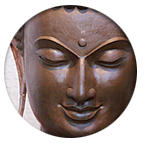Soon after reaching enlightenment, Buddha shared his insights with a group of fellow seekers—people who were truly noble in spirit. Often, therefore, referred to as the Four Noble Truths, these teachings contain all the ideas inherent in Buddhism, and together form a path towards enlightenment.
-
Suffering is the problem
-
The root cause of suffering is clinging or desire
-
Suffering can be overcome
-
The Eightfold Path offers freedom from suffering
 To see Rinpoche discuss the importance of the right view, right meditation and right conduct, please click here.
To see Rinpoche discuss the importance of the right view, right meditation and right conduct, please click here.The First Truth: Suffering is the problem
Suffering from Suffering: The most obvious form of suffering is something that is clearly painful: hunger, thirst, sickness—or even an argument. Life is more pleasant if this suffering goes away.
Suffering from Change: Change is a constant in our lives. Relationships grow apart. Our favorite clothes wear out. A new boss takes over. We age. Yet, we would rather have everything stay the same. So when it doesn’t, we often feel irritation, anger, fear or loss. Our reaction to life’s inherent instability causes us to suffer.
All-Pervasive Suffering: At its most profound, we suffer because of how we perceive ourselves in relation to the world. Taken from this view, our entire worldly experience is suffering. This sounds deeply pessimistic; in fact, it is just the opposite. Understanding the nature of our experience at its most subtle allows us to mold it, and to change our perception through the wisdom of insight.
The Second Truth: The root cause of suffering is clinging or desire
Have you ever noticed how suffering intensifies when we fight it? The more we concentrate on it—and the madder we get—the more magnified it becomes.
This is the Second Truth: We cling to our desire for something other than what is happening at this very moment. The tighter we hold on, the greater our discomfort. Even when we are happy, we wish the joy would last—yet we know it won’t, and we suffer from that knowledge. Suffering, therefore, is caused not by the actual experience, but by our relationship to it.
-Shakespeare
The Third Truth: Suffering can be overcome
If the root cause of suffering resides in our minds, then freedom from suffering can be found by looking deeply at the true nature of our minds.
It is important to note the word used for that freedom: Enlightenment. It means understanding, wisdom, clarity and compassion. It means that we have recognized and experienced the way things truly are. It means we have moved beyond the self-absorbed, ego-filtered perspective with which we typically approach life.
As we move towards enlightenment, suffering naturally subsides. We can let go of our need to protect our sense of self. Instead of clinging to hopes, we begin to experience life as a fluid, interconnected whole.
The Fourth Truth: The Eightfold Path offers freedom from suffering
The Fourth Truth—the Eightfold Path—is a doorway into all Buddhist thinking and daily practice. These eight simple directives not only form the path by which to attain enlightenment, their consistent practice establishes the conditions in which enlightenment can be achieved.
Wisdom: Pursue an understanding of the ‘the way things truly are.’
1. Right View: Experience reality as it truly is, guided by the key tenets of Buddhist teaching such as dependent origination, karma, impermanence, selflessness, and emptiness.
2. Right Intention: Always have the intention to be present, right now, in this moment. If we practice something over and over again, eventually it becomes automatic.
Wisdom is both the path toward understanding and the final goal of enlightenment itself, when our views and intentions are unencumbered, unquestioning and clear. This is the point in which wisdom does not require effort because it is drawn wholly from our own experience.
Morality: Live in a way that supports and enhances our pursuit of wisdom. Do not choose actions that harm others, engender anger or hatred, or reinforce an ego-centric relationship to the world.
3. Right Speech: Do not swear, lie (actively or by omission), spread gossip or speak in ways that would harm others. Listen for the truth and speak the truth—or don’t speak at all.
4. Right Action: Promote harmony and unity, not divisiveness and separation among people. Treat others as we would like to be treated.
5. Right Livelihood: Choose a living that does not harm anyone. Harm can be physical, psychological or spiritual.
Morality is a matter of practicing what will benefit ourselves and others throughout life. As wisdom and awareness increase through practice, beneficial choices become easier to see in the midst of the chaos of daily life.
Practice: Results come from hard work and consistency. They require practice, which in turn requires a balance of positive energy, focus and understanding. The last three points are those from which all Buddhist practice methods derive.
6. Right Effort: Concentrate on being present, during meditation and in daily life.
7. Right Mindfulness: Maintain an awareness of our bodies, minds, emotions and all sensory input. Keep awareness in the present, at every moment.
8. Right Meditation: Explore and develop Right View, Right Intention, Right Effort and Right Mindfulness through meditation. The guidance of a skilled teacher is essential to learn effective meditation techniques.
All eight points are equally important, each supporting and reinforcing the other. For instance, the Right Meditation practice will help expand the understanding of Right Views. At the same time, the Right View will help remind us of the goal of Wisdom and support the effort we put into the three aspects of Practice.

LIVE BETTER
Life is complex, puzzling and often painful.
Sometimes it seems there must be a better way
to manage—and there is. It is as simple as looking
at a problem through a different lens.




